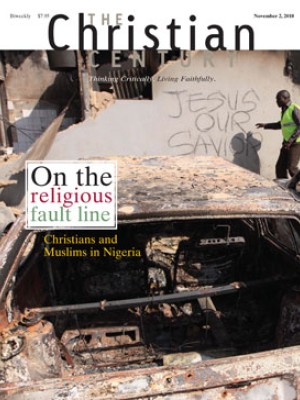Sunday, November 7, 2010: Luke 20:27-38
Years ago, the brilliant but cantankerous Baptist preacher Carlyle Marney was speaking to some students at a Christian college. When a student asked, "Dr. Marney, would you say a word or two about the resurrection of the dead?" Marney replied, "I will not discuss the resurrection with people like you: I don't discuss such things with anyone under 30. Look at you all: in the prime of life. Never have you known honest-to-God failure, heartburn, impotency, solid defeat, brick walls or mortality. You're extremely apt and handsome—white kids who have never in all of your lives been 30 miles from home, or 20 minutes into the New Testament, or more than a mile and a half from a Baptist or Methodist church, or within a thousand miles of any issue that mattered to a kingdom that matters. So what can you know of a world that makes sense only if Christ is raised?"
In my church, sometimes someone approaches me after the service with a particularly inane question—one that reveals that the questioner not only did not listen to the sermon but inhabits a different world from my sermon and what I hope the church is about. Someone may tell me that he's interested in helping start a new Bible study (I give him my full attention!), but he wants it on a DVD and doesn't want to actually read the Bible or do any homework—and he has only an hour for it so it needs to be a kind of quick, instant lesson. My heart sinks. I know he doesn't understand. How do we teach and preach the incarnated, shared life in Christ to people accustomed to sound-bite answers to abstract questions? How do we speak of the resurrection to folks who haven't a clue about crucifixion?
Read our latest issue or browse back issues.
In Luke 20, the Sadducees are asking Jesus about the resurrection but don't get what Jesus is talking about, and they don't really want to get it. They just want to debate him and try to show him up in front of the people. Jesus is speaking of another world.
Of course, the Sadducees were not believers in the resurrection. They were looking for a fight when they asked a strange question based upon some obscure knowledge of the law, and Jesus responded with an involved answer. He didn't answer them as he did Martha, with "I am the resurrection and the life. Those who believe in me, even though they die, will live. . . . Do you believe this?" (John 11:20-26).
Martha got a different answer because she was ready to receive the kingdom that Jesus was incarnating and proclaiming. In her grief for Lazarus, the news of the resurrection was good and not simply a Glenn Beck kind of debate question.
To the Sadducees Jesus said, "Get out of your old-world way of thinking. The resurrection is a new way in a new world. Unjust social arrangements—in which women have no hope, no standing and no safety net unless they are married—will pass away. The age to come will be a whole new way of life that you cannot even begin to comprehend."
Years ago a Major League pitcher was asked what he thought about his future prospects. He answered, "The future is like the present, only longer." Like that pitcher and like the Sadducees, to receive God's way in Christ we have to get away from thinking that the resurrection is like the present only longer. We are called to enter a whole new world, a new way. When Jesus speaks of the resurrection, he is giving us a glimpse of God's new world. It is something beyond our present experience, something that we can know only through hope, through faith in the living God.
Furthermore, that hope and faith is lived out with Jesus and his disciples, which is another reason that Jesus was able to give Martha a different answer from the one he gave the Sadducees. Martha was a disciple. Understanding the resurrection and the kingdom were inseparable from walking with Jesus and his other disciples, including Martha's sister Mary and brother Lazarus. Within the Jesus community, conversations about the resurrection were not abstracted from their shared life and practices, their shared grief over the death of Lazarus and their shared hope. The Sadducees had no interest in sharing such a life with Jesus, and therefore had no idea what he was talking about.
In some lectures at Southern Methodist University, Marney confessed that there were days he didn't know if he believed in the resurrection or not. Afterward, his friend Albert Outler stopped him in the hall and said, "Marney, whoever told you that you had to believe in the resurrection every day?" "Well, Albert," Marney responded, "if you know so much, when do I have to believe in the resurrection?" Outler said, "On the day you die and the day you help someone else die; that's when you believe in the resurrection."
Not long before Marney died in 1978, he preached at First Baptist Church in Greenville, South Carolina, about death, resurrection and the church. On the way back to the hotel, one of Marney's friends said, "If I didn't know better, I'd think you believe in the resurrection." Marney quickly responded, "Well, I do . . . when I'm around the right people."
Carlyle Marney was one of those honest believers for whom belief in the resurrection had rarely been easy. But he had learned that the resurrection is not an abstract issue and that without sharing a life of discipleship, suffering and hope with others, resurrection is incomprehensible.





